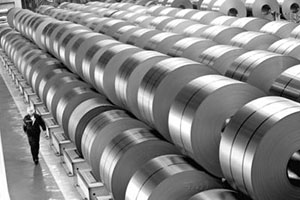The British enlightenment to global overcapacity in steel change
Date:2017-12-12 04:24:42 Visit:2098
.Global over-capacity steel ministerial conference recently concluded in Berlin, Germany, overcapacity is a global proposition to become participants consensus. The United Kingdom pioneered the modern steel industry, which has produced about half of global output but now imports 80% of its total annual steel consumption. The history of the British steel industry has some enlightenment on the global response to overcapacity.

Since the invention of the low-cost BOF method by British inventor Bessemer in the 1850s, Britain has gradually become the world's steel hub and the steel industry has become an important contributor to the UK economy. In the early 70s of last century the peak steel production in Britain, the steel industry employed as many as 320,000.
However, after experiencing the two world wars, the economy and national strength of the UK are affected. The government is also wavering in the iron and steel industry policy. With the advent of economic globalization, the British steel industry has been declining due to its inefficiency and increased external competition.
In 2015, SSI, the UK's second-largest steelmaker, announced the bankruptcy of its Redcar factory and another major steelmaker, Kapaluo Steel, also declared bankruptcy, leaving thousands of workers unemployed. In March 2016, Tata Steel, the largest British steel producer, announced that it has considered divesting some or all of Tata Steel in the light of the deteriorating business in the UK in the past year.
Although the number of jobs provided directly by the steel production sector is small, the continuous shutdown of steel mills will inevitably affect the employment in such industries as steel distribution, trade, scrap metal recycling and metal products production. At the same time, as steel is the cornerstone of manufacturing, the decline in the steel industry has a negative impact on manufacturing, which accounts for about 10% of the UK economy.
Vince Cable, a former British minister for business, innovation and skills, argues that the predicament of the British steel industry stems from its lack of competitiveness and the neglect of government and private sector investment in the industry. In addition, high energy costs, lack of raw materials, increased external competition is also the main reason for its shrinking.
When interviewed by Xinhua News Agency reporters, Fu Xiaolan, professor of international development at Oxford University, said that Britain is a highly open market economy. As emerging industries rise, traditional industries lose their international competitiveness and gradually withdraw from the stage.
From the world steel center to the entire industry in trouble, British society is quite shocked. Although the British government said it will do its utmost to save jobs, but did not take nationalization measures to revive the steel industry.
According to Fu Xiaolan introduction, in the process of industrial restructuring and upgrading, the British government has played an active role in providing social security and reemployment training. In terms of social security, the mature pension system in the United Kingdom provides some welfare benefits to laid-off workers and workers can also apply for unemployment benefits and government welfare housing. In terms of re-employment, the government provides training and information to guide unemployed workers to new jobs Gain employment opportunities in the industry.
Fu Xiaolan pointed out that the British government does not directly interfere with the market, while British companies are very sensitive to the market. The steel industry realizes that due to the high production costs of energy and manpower, only high-end products with high technological content will have international competitiveness if they are transformed






